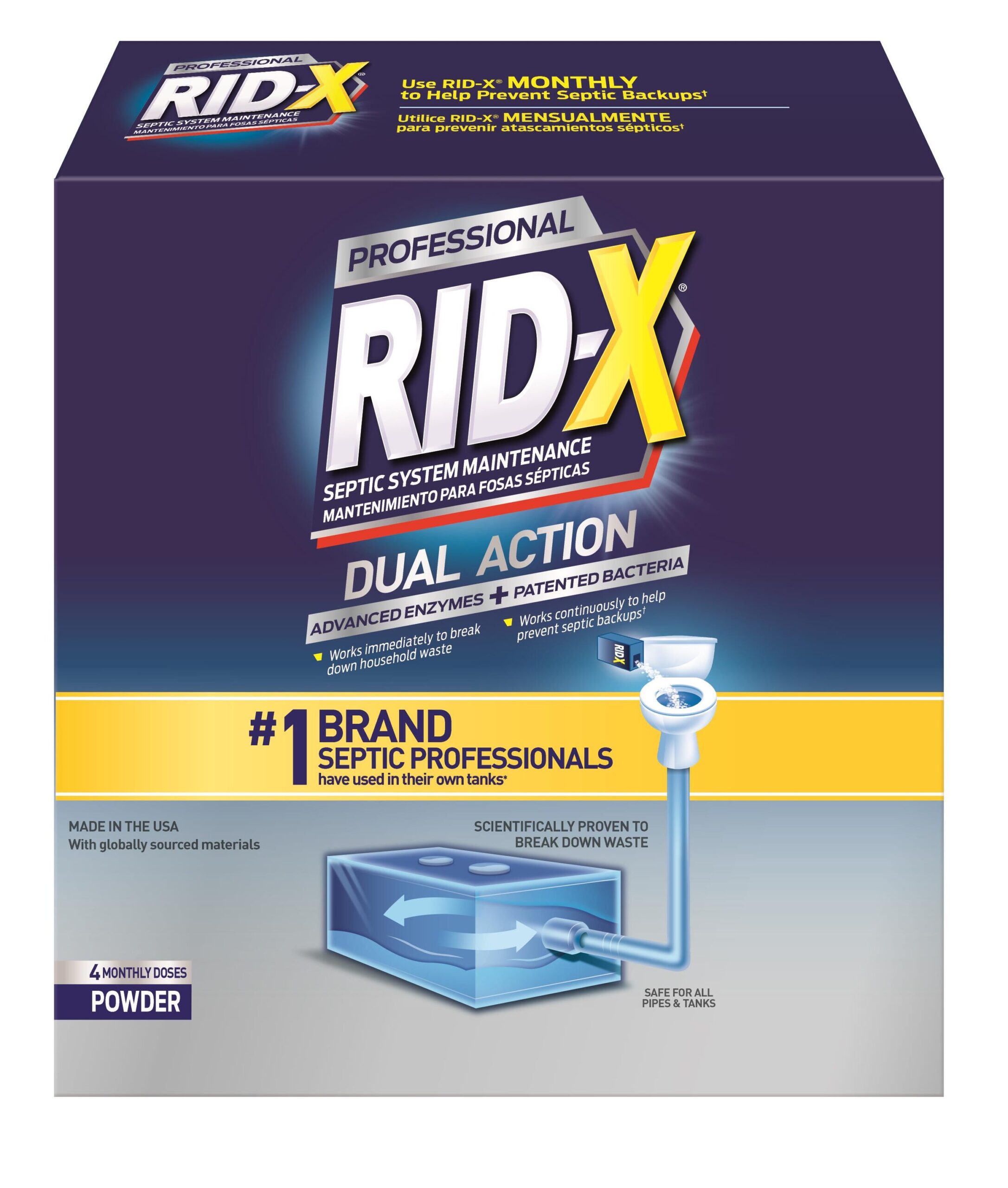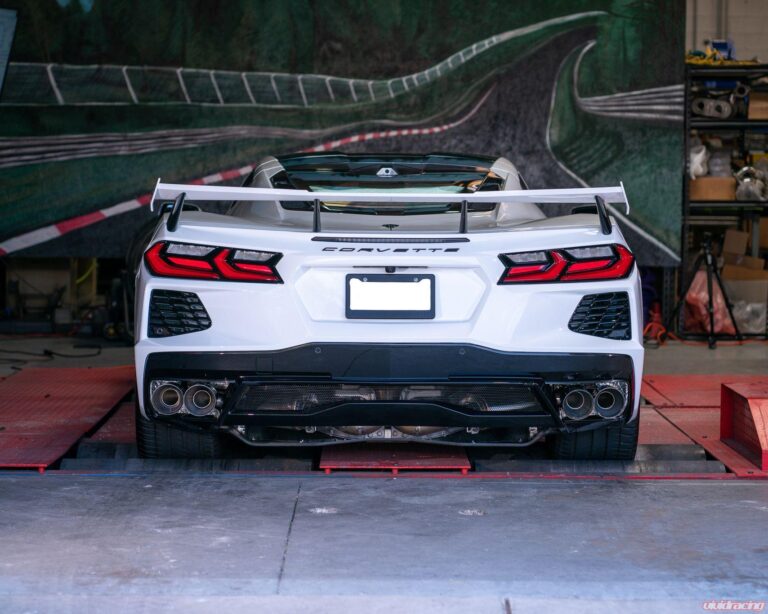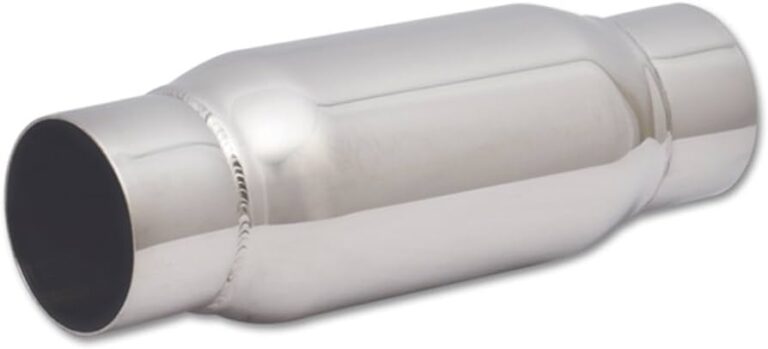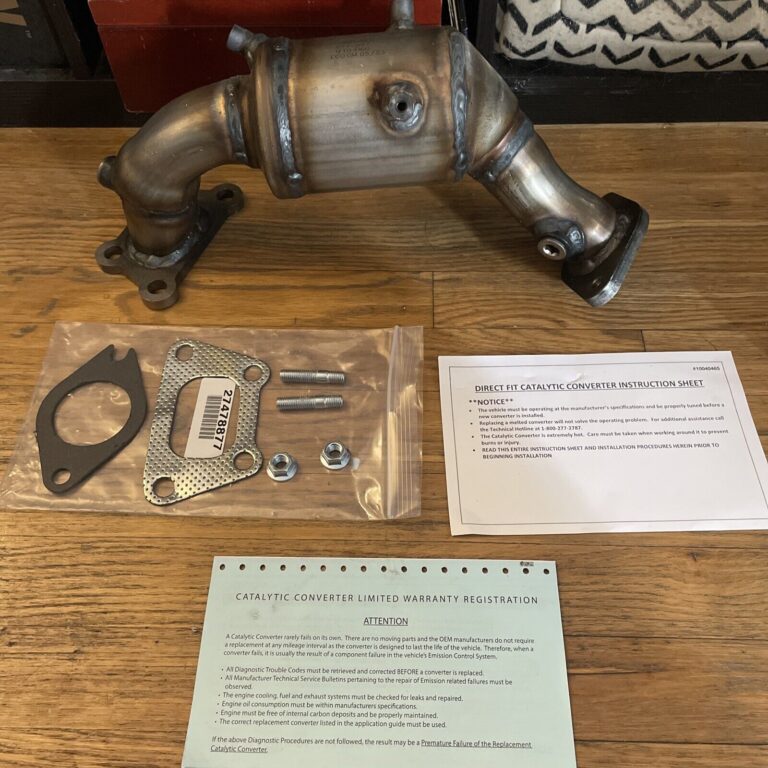What Can Cause Your Exhaust System to Deteriorate Over Time? Discover the Power of Preventive Maintenance!
Over time, the exhaust system can deteriorate due to factors like corrosion, engine vibrations, and normal wear and tear. As your vehicle ages, its exhaust system is susceptible to deterioration caused by various factors.
One such factor is corrosion, which gradually weakens the exhaust components, leading to leaks and reduced performance. Additionally, engine vibrations can contribute to the wearing out of the exhaust system, particularly the hangers and brackets that support it. Moreover, the continuous exposure to high temperatures and the harsh conditions faced by the exhaust system accelerate its degradation over time.
Therefore, regular maintenance and inspection are crucial to ensure the longevity and optimal functioning of your vehicle’s exhaust system.
The Importance Of Preventive Maintenance For Your Exhaust System
The Importance of Preventive Maintenance for Your Exhaust System
Regular maintenance is crucial for extending the lifespan of your exhaust system. Without proper care, various factors can contribute to its deterioration over time.
- Temperature extremes: Exposure to extreme hot and cold temperatures can cause corrosion and weaken the exhaust system components.
- Moisture: Condensation can occur within the exhaust system, leading to rust and corrosion. This is especially true for short trips, where the system doesn’t fully heat up to evaporate the moisture.
- Vibrations: The engine, road conditions, and other factors can cause vibrations that may loosen or damage components of the exhaust system.
- Chemical exposure: Road salt, chemicals in the environment, and aggressive cleaning agents can all contribute to the degradation of the exhaust system.
In conclusion, investing in regular preventive maintenance for your exhaust system is essential. By addressing potential issues early on, you can prevent further damage and expensive repairs.
Common Causes Of Exhaust System Deterioration
The exhaust system in your vehicle can deteriorate over time due to various factors. One major cause of deterioration is corrosion caused by exposure to moisture and road salt. The combination of water and salt on the roads during winter can lead to rust formation on the exhaust components.
Another factor that affects the longevity of the exhaust system is the heat and stress it endures from constant use. The extreme temperatures generated by the engine and the constant rumble of the exhaust gases passing through the system contribute to wear and tear over time.
Furthermore, the exhaust system is susceptible to impact damage from road debris. Small rocks, gravel, and other objects on the road can hit the underside of the vehicle where the exhaust system is located, resulting in dents, holes, or even complete breakage of the pipes.
Regular maintenance and inspections can help identify any issues with the exhaust system early on and prevent further deterioration. It’s important to address any signs of corrosion, unusual noises, or visible damage to ensure the proper functioning of your vehicle’s exhaust system.
Corrosion From Moisture And Road Salt
Over time, one of the main causes of exhaust system deterioration is corrosion, particularly as a result of moisture and road salt. Moisture can enter the exhaust system through condensation, and road salt can accelerate the corrosion process due to its corrosive properties. The effects of moisture and salt on exhaust components can be significant. Moisture can cause rust to form on the exhaust pipes, mufflers, and other components, leading to holes and leaks. Road salt can further worsen the corrosion, causing the exhaust system to deteriorate at a faster rate.
To prevent and minimize the deterioration caused by moisture and salt, regular maintenance is essential. Inspecting the exhaust system for signs of rust and damage, especially after the winter season, is crucial. Additionally, washing the underside of your vehicle regularly to remove salt and debris can help prevent buildup and corrosion. Applying protective coatings or sprays to exhaust components, such as heat-resistant paint or anti-corrosion treatments, can also provide an extra layer of defense. Lastly, storing your vehicle in a dry, covered environment can help reduce exposure to moisture and salt, further extending the lifespan of your exhaust system.
| Prevention Tips | Maintenance Tips |
|---|---|
|
|
Heat And Stress From Constant Use
Heat and Stress from Constant Use
The exhaust system in your vehicle is constantly exposed to high temperatures and tremendous stress due to its function of expelling hot gases from the engine. Over time, this heat and stress can cause the exhaust system to deteriorate.
How high temperatures and constant use impact exhaust systems
The high temperatures produced by the engine can cause the metal components of the exhaust system, such as the manifold, pipes, and catalytic converter, to expand and contract repeatedly. This expansion and contraction, combined with the vibrations generated by the engine and the constant exposure to hot exhaust gases, can lead to cracks, leaks, and weakened connections within the system.
Tips for managing heat and stress
- Regular maintenance: Schedule regular inspections and maintenance checks to identify any potential issues early on.
- Quality components: Invest in high-quality exhaust system components that can withstand the heat and stress.
- Proper driving habits: Avoid excessive idling, rapid acceleration, and exposing the vehicle to prolonged high-temperature conditions.
- Engine tune-ups: Keep your engine properly tuned to ensure it operates efficiently and doesn’t generate excessive heat.
- Protective coatings: Consider applying heat-resistant coatings to the exhaust system components to provide an additional layer of protection against heat and corrosion.
Impact Damage From Road Debris
Impact damage from road debris can have a significant effect on the condition of your exhaust system over time. The constant exposure to rocks, gravel, and other debris can cause dents, scratches, and even punctures in various components of the exhaust system. These damages can lead to a decrease in performance, increased noise, and potential leaks.
To minimize the risk of impact damage, protective measures can be taken. One option is to install a skid plate or protective shield under the vehicle to provide an extra layer of defense against debris. Another option is to avoid driving on roads with loose gravel or other hazardous conditions whenever possible.
In addition, regular inspection and maintenance of the exhaust system are crucial in detecting any damage early on. Periodically check for any signs of dents, leaks, or loose connections. Replacing damaged components promptly can prevent further deterioration of the exhaust system and ensure optimal performance.
Signs Of Exhaust System Deterioration
Exhaust systems are an integral part of a vehicle, and over time they can deteriorate due to various factors. One of the signs of exhaust system deterioration is unusual noises or vibrations. If you notice any strange sounds, such as rattling, hissing, or banging, it could indicate a problem with your exhaust system. Another sign to look out for is decreased fuel efficiency. If you find that you need to fill up your tank more frequently than usual, it could be a result of a compromised exhaust system. Additionally, if you smell exhaust fumes inside your vehicle, it is a clear indication that there is a leak in the exhaust system, which should be addressed immediately.
Unusual Noises Or Vibrations
Unusual Noises or Vibrations
One of the common indicators of exhaust system issues is unusual noises or vibrations. The exhaust system is designed to operate quietly and smoothly. However, over time, it can deteriorate, leading to noises and vibrations that are out of the ordinary.
| Noise/Vibration | Possible Cause |
|---|---|
| Loud rumbling | A hole or leak in the muffler or exhaust pipe |
| Hissing or popping | A leak in the exhaust manifold or gasket |
| Rattling or clunking | Loose or damaged hangers, brackets, or heat shields |
| Vibrations | Mounts or brackets worn out or damaged |
If you notice any of these noises or vibrations, it is important to have your exhaust system checked by a professional. Ignoring the problem could lead to further damage and potentially hazardous conditions. Identifying the specific sounds and vibrations can help pinpoint the source and severity of the issue, allowing for a more accurate diagnosis and repair.
Decreased Fuel Efficiency
The fuel efficiency of your vehicle can be greatly impacted by problems with your exhaust system. A clogged or damaged exhaust system can restrict the flow of exhaust gases, leading to a decrease in fuel efficiency. When the exhaust gases can’t flow freely, the engine has to work harder to push them out, resulting in increased fuel consumption.
One common issue that affects fuel economy is a faulty oxygen sensor. This sensor measures the amount of oxygen in the exhaust gases and sends this information to the engine control unit (ECU). If the sensor is not functioning properly, the ECU may not be able to adjust the air-fuel mixture accurately, leading to both poor fuel economy and increased emissions.
Another culprit behind decreased fuel efficiency is a leak in the exhaust system. Leaks can occur due to corrosion or damage to the pipes and joints. These leaks allow unburned fuel to escape, reducing fuel efficiency and potentially causing a decrease in engine power.
Regular monitoring and maintenance of your exhaust system can help ensure optimal fuel efficiency. Timely repairs or replacements of faulty components, such as the oxygen sensor or exhaust pipes, can help improve fuel economy and prevent further damage to your vehicle.
Exhaust Fumes Inside The Vehicle
In modern vehicles, it is essential to pay attention to the exhaust system, as its deterioration can lead to various issues. One such problem is the presence of exhaust fumes inside the vehicle, which can pose serious health risks. The exhaust fumes contain harmful gases like carbon monoxide, nitrogen oxides, and particulate matter, which can have detrimental effects on human health, such as headaches, dizziness, nausea, and even asphyxiation in severe cases. This issue usually occurs due to exhaust leaks, which may have several causes, including rust or corrosion, loose connections, damaged gaskets, or faulty seals.
Addressing exhaust leaks is crucial to ensure the safety and well-being of passengers. Regular maintenance and inspection of the exhaust system are necessary to identify and fix any leaks promptly. It is advisable to consult a professional mechanic who can diagnose the problem and carry out the necessary repairs or replacements. Ignoring exhaust leaks can lead to further deterioration of the system and increased health risks. By prioritizing the maintenance of the exhaust system, you can ensure a safer and healthier driving experience.
Tips For Preventing Exhaust System Deterioration
Regular inspections and maintenance are key to preventing exhaust system deterioration. Inspecting your exhaust system regularly will help identify any potential issues before they become major problems. Make sure to check for any visible signs of damage such as rust, cracks, or leaks. Schedule regular maintenance with a trusted mechanic who can perform routine checks and necessary repairs. Additionally, keeping up with scheduled oil changes and air filter replacements will help maintain a proper functioning exhaust system.
Your driving habits can have a significant impact on the lifespan of your exhaust system. Avoid aggressive acceleration and sudden stops as these can put stress on the system. Try to drive smoothly and avoid long periods of idling, as this can cause excessive heat and accelerate deterioration. Similarly, avoid driving through deep water or off-road conditions that can expose the exhaust system to excessive moisture and debris. Consistently practicing proper driving techniques will reduce the strain on your exhaust system and help prolong its lifespan.
Regular Inspections And Maintenance
Regular inspections and maintenance are key to preventing deterioration of your exhaust system over time. Professional inspections should be conducted at regular intervals to ensure any potential issues are identified and addressed promptly. These inspections should be done by trained technicians who can thoroughly assess your exhaust system for any signs of wear, damage, or malfunction. The frequency of professional inspections may vary depending on various factors such as the age and condition of your vehicle, as well as your driving habits. It is recommended to follow the manufacturer’s guidelines regarding the frequency of inspections and adhere to their recommendations. In addition to professional inspections, there are some DIY maintenance tips you can follow to take care of your exhaust system. These include regularly cleaning and inspecting the exhaust pipes and muffler for any signs of corrosion or damage, checking for loose or missing hangers, and ensuring proper alignment of the exhaust system components. By following these guidelines and being proactive in maintaining your exhaust system, you can help prolong its lifespan and avoid costly repairs or replacements.
Proper Driving Techniques
Driving habits play a significant role in the health and longevity of your exhaust system. By following these tips, you can minimize wear and tear on your vehicle’s exhaust system:
- Avoid unnecessary idling: Continuous idling causes your exhaust system to overheat and can lead to premature deterioration.
- Observe speed limits: Driving at high speeds can put excessive strain on your exhaust system, leading to increased wear.
- Avoid rough roads: Potholes and uneven surfaces can cause physical damage to your exhaust system, including cracks and leaks.
- Regular maintenance: Keeping up with routine maintenance tasks like oil changes and tune-ups can help identify and address exhaust system issues before they worsen.
- Avoid harsh acceleration and braking: Abrupt acceleration and hard braking can strain your exhaust system and contribute to its deterioration.
- Schedule inspections: Periodically have your exhaust system inspected by a professional to detect any hidden issues and ensure proper functioning.
By implementing these driving practices, you can extend the lifespan of your exhaust system and enjoy a smoother, quieter ride.
Conclusion: Invest In Preventive Maintenance For Longevity
Investing in preventive maintenance for your exhaust system is crucial for its longevity. Regular maintenance helps to identify and address potential issues before they escalate into major problems. This not only saves you from costly repairs but also ensures that your exhaust system continues to function optimally.
Preventive maintenance offers several benefits for your exhaust system. It helps to keep the system clean and free from debris, ensuring proper airflow. Regular inspections can detect any leaks or cracks in the exhaust pipes, preventing harmful fumes from entering the cabin. Furthermore, maintenance can help identify and replace worn-out or damaged components, such as the muffler or catalytic converter, which can improve overall performance and fuel efficiency.
By taking proactive measures and investing in preventive maintenance, you can extend the lifespan of your exhaust system and avoid unexpected breakdowns. Routine inspections, cleaning, and repairs as needed will help keep your exhaust system in top shape for years to come.

Credit: www.foothillsgroup.ca
Frequently Asked Questions On What Can Cause Your Exhaust System To Deteriorate Over Time?
What Is The Life Expectancy Of An Exhaust System?
The life expectancy of an exhaust system varies depending on factors like quality, driving conditions, and maintenance. On average, it can last around 5 to 7 years, but proper care and regular inspections can extend its lifespan.
What Is The Most Common Problem Of The Exhaust System?
The most common issue with the exhaust system is a leak, which can cause loud noises and decreased performance. Other problems include rust, broken hangers, and a faulty catalytic converter. Regular inspection and maintenance help prevent these issues.
What Are The Symptoms Of A Damaged Exhaust System?
Symptoms of a damaged exhaust system include loud noises, reduced fuel efficiency, vibrations, and foul odors.
What Are The Common Causes Of Exhaust System Deterioration?
Over time, rust, corrosion, and exposure to harsh weather conditions can cause exhaust pipes and mufflers to deteriorate. Additionally, driving on rough roads or through potholes can lead to physical damage, while engine problems like coolant leaks or burning oil can also contribute to exhaust system deterioration.
Regular maintenance and inspections can help prevent or address these issues.
Conclusion
To sum up, regular wear and tear, environmental factors, and poor maintenance can all contribute to the deterioration of your exhaust system over time. By understanding the potential causes, you can take proactive measures to prevent or minimize damage. Remember to schedule routine inspections and maintenance, avoid harsh driving conditions, and promptly address any issues to keep your exhaust system in optimal condition for years to come.
Protect your investment and ensure a smooth and efficient running vehicle.








